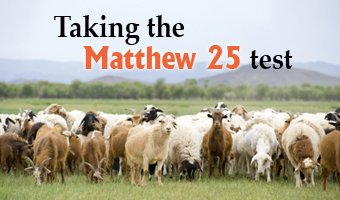When it comes to judging livestock, some Baptists have a beef with sheep and goats.
In Matthew 25:31-46, Jesus describes Judgment Day, with all the nations gathered around God's throne and people separated into two groups – sheep on one side, goats on the other.
 |
The sheep are invited to enter into the kingdom prepared for them, while the goats are consigned to hellfire prepared for the devil and his helpers.
To distinguish sheep from goats, Jesus talks about feeding the hungry, welcoming the stranger, caring for the sick, visiting people in prison and other kind acts. Christ equates ministry to "the least of these my brothers" as service to him.
To some, that sounds too much like salvation by works, rather than salvation by grace through faith. But others see no contradiction – just a challenge to make sure grace produces a transformed life characterized by care for the vulnerable.
Grace or works
"There is no dichotomy between faith and works," said Van Christian, pastor of First Baptist Church in Comanche, Texas. "Good works are not an option in order to be saved; salvation is by grace alone. Good works are not an option once we are saved; whoever claims to be in Christ must walk as he walked."
Christian notes the Apostle Paul wrote about salvation by grace through faith – not as a result of works – in Ephesians 2:8-9, but in the very next verse he says Christ's followers are created for good works. Works do not earn salvation, but they demonstrate it, he insisted.
"Faith in Jesus Christ is demonstrable, visible and easily recognizable," said Christian, chairman of the Baptist General Convention of Texas Executive Board.
Robert Prince, pastor of First Baptist Church in Waynesville, N.C., agrees. God saves people by his grace, received through faith, but that salvation produces tangible evidence – good fruit.
"When we know Christ relationally, we bear the fruit of good works," said Prince.
The unrighteous in Matthew 25 – the goats in the parable – demonstrate by their lack of concern for vulnerable people no vital relationship with Christ, he explained.
"If they had been in a relationship with Christ, they would have borne the fruit of love and compassion for those in need. The problem is that many who call themselves believers don't understand that a relationship with Christ leads to care for the poor and hurting."
Keith Herron, pastor of Holmeswood Baptist Church in Kansas City, believes Jesus in Matthew 25 describes accountability for stewards of faith and influence.
"We don't believe there's much wiggle room in our stewardship of the faith along the lines of Matthew 25. To be an authentic follower of Jesus, we will follow him in these ways.
"This is not a matter of salvation; this is a matter of being Christ's followers in our realms of influence," said Herron, moderator-elect of the Cooperative Baptist Fellowship.
"Our realms of influence are centered and grounded in our physical location, but the world we serve is understood to be wherever we go between Sundays."
Too often, an overemphasis on piety can separate Baptist churches from the nitty-gritty needs of their communities, he asserted.
"We hide behind our piety, mislabeling and condemning our involvement as 'local politics' and implying such involvement would be crass or messy," he said. "Our stewardship of faith pulls us toward our community's needs and draws us to action."
Charity or justice
Proper understanding of the kind of compassionate response Jesus describes in Matthew 25 moves Christians from acts of charity to a hunger for justice, Prince insisted.
"To help 'the least of these,' we must not only engage in individual acts of charity, but also confront systems that deprive people of the ability to care for their own needs," he said.
"Individual aid is important, but oftentimes it provides only temporary relief. The systems that hurt the poor are cultural, social and governmental. Individual aid is insufficient, as are government reform and social change.
"To help the poor, we need to be engaged at all these levels."
Holmeswood tries to minister at all levels, as well – being willing to "tackle the tough issues," Herron said, and to minister to specific needs.
Ministry requires sensitivity and a willingness to build relationships with their neighbors. "We don't try to take over a person's ability to care for themselves, but we recognize that being a neighbor means being willing to enter into their experience," he said.
Holmeswood's members help their neighbors in ways that "still honor their own dignity."
The challenge for the church is to "do what we can with what we have," he added.
Demonstrate God's love
The Holmeswood congregation reaches out to its community through several ministries, and feel that one of their most vital relationships is that with a local school district.
"We regularly work with the school social workers in directing help resources toward validated need," Herron explained.
"A child's needs are high priorities for the social workers and valued by our church so that we can often assist with a need for a child or family here in our neighborhood."
He noted that social workers are the experts in determining the most pressing needs for a child on all levels – from family relationships to parental needs. The church can help with a child's most basic necessities.
"When we can work together to positively influence the child's basic needs with food, healthcare such as obtaining glasses, or some other physical need – a warm coat or some other tangible need, we're effectively bearing witness," he said.
Related articles and resources:
I was hungry: Matthew 25 ministries
I was a stranger: Matthew 25 ministries
I was in prison: Matthew 25 ministries
Matthew 25 lifestyle: You served me… (PDF list of representative agencies carrying out Matthew 25-type ministries)




